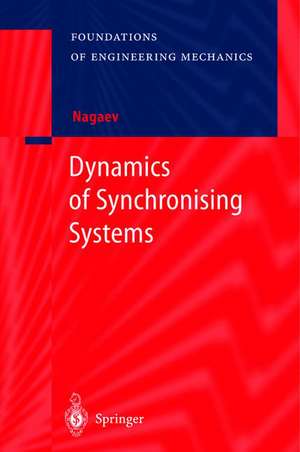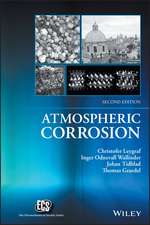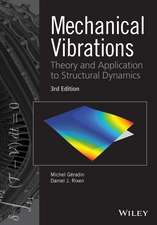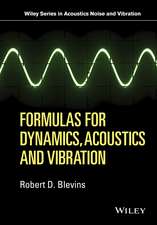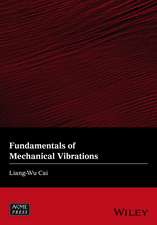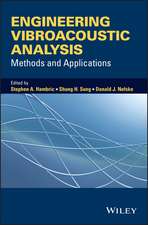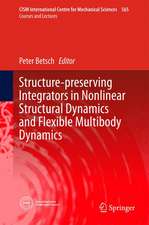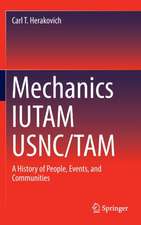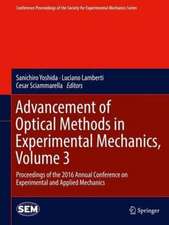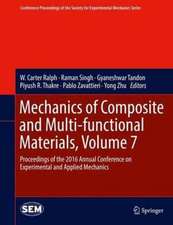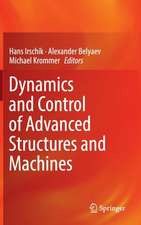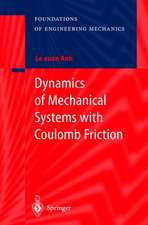Dynamics of Synchronising Systems: Foundations of Engineering Mechanics
Autor R.F. Nagaev Traducere de Alexander Belyaeven Limba Engleză Hardback – 2 dec 2002
| Toate formatele și edițiile | Preț | Express |
|---|---|---|
| Paperback (1) | 946.24 lei 6-8 săpt. | |
| Springer Berlin, Heidelberg – 20 iul 2012 | 946.24 lei 6-8 săpt. | |
| Hardback (1) | 952.26 lei 6-8 săpt. | |
| Springer Berlin, Heidelberg – 2 dec 2002 | 952.26 lei 6-8 săpt. |
Din seria Foundations of Engineering Mechanics
- 15%
 Preț: 585.26 lei
Preț: 585.26 lei - 18%
 Preț: 1112.30 lei
Preț: 1112.30 lei - 18%
 Preț: 786.36 lei
Preț: 786.36 lei - 15%
 Preț: 650.55 lei
Preț: 650.55 lei - 15%
 Preț: 646.11 lei
Preț: 646.11 lei - 18%
 Preț: 948.47 lei
Preț: 948.47 lei - 18%
 Preț: 956.69 lei
Preț: 956.69 lei - 15%
 Preț: 643.34 lei
Preț: 643.34 lei - 18%
 Preț: 948.47 lei
Preț: 948.47 lei - 18%
 Preț: 953.82 lei
Preț: 953.82 lei - 18%
 Preț: 951.29 lei
Preț: 951.29 lei - 18%
 Preț: 1386.62 lei
Preț: 1386.62 lei - 15%
 Preț: 644.49 lei
Preț: 644.49 lei - 18%
 Preț: 2117.76 lei
Preț: 2117.76 lei - 18%
 Preț: 951.91 lei
Preț: 951.91 lei - 18%
 Preț: 957.62 lei
Preț: 957.62 lei -
 Preț: 391.99 lei
Preț: 391.99 lei - 18%
 Preț: 1223.43 lei
Preț: 1223.43 lei - 18%
 Preț: 1213.46 lei
Preț: 1213.46 lei - 15%
 Preț: 634.32 lei
Preț: 634.32 lei - 15%
 Preț: 644.30 lei
Preț: 644.30 lei - 15%
 Preț: 646.11 lei
Preț: 646.11 lei - 15%
 Preț: 641.71 lei
Preț: 641.71 lei - 15%
 Preț: 635.01 lei
Preț: 635.01 lei - 18%
 Preț: 955.25 lei
Preț: 955.25 lei - 18%
 Preț: 1234.46 lei
Preț: 1234.46 lei - 20%
 Preț: 1289.59 lei
Preț: 1289.59 lei - 18%
 Preț: 952.89 lei
Preț: 952.89 lei - 18%
 Preț: 1247.88 lei
Preț: 1247.88 lei - 18%
 Preț: 947.18 lei
Preț: 947.18 lei - 15%
 Preț: 631.21 lei
Preț: 631.21 lei - 18%
 Preț: 1231.16 lei
Preț: 1231.16 lei
Preț: 952.26 lei
Preț vechi: 1161.29 lei
-18% Nou
Puncte Express: 1428
Preț estimativ în valută:
182.21€ • 190.76$ • 150.77£
182.21€ • 190.76$ • 150.77£
Carte tipărită la comandă
Livrare economică 05-19 aprilie
Preluare comenzi: 021 569.72.76
Specificații
ISBN-13: 9783540441953
ISBN-10: 3540441956
Pagini: 332
Ilustrații: X, 326 p. 22 illus.
Dimensiuni: 155 x 235 x 23 mm
Greutate: 0.64 kg
Ediția:2003
Editura: Springer Berlin, Heidelberg
Colecția Springer
Seria Foundations of Engineering Mechanics
Locul publicării:Berlin, Heidelberg, Germany
ISBN-10: 3540441956
Pagini: 332
Ilustrații: X, 326 p. 22 illus.
Dimensiuni: 155 x 235 x 23 mm
Greutate: 0.64 kg
Ediția:2003
Editura: Springer Berlin, Heidelberg
Colecția Springer
Seria Foundations of Engineering Mechanics
Locul publicării:Berlin, Heidelberg, Germany
Public țintă
ResearchCuprins
1 Locally integrable dynamical systems.- 1.1 Concept of local integrability.- 1.2 Linear heterogeneous systems.- 1.3 Piecewise-continuous systems.- 1.4 Homogeneous Lyapunov systems.- 1.5 On local integrability of the equations of motion of Hess’s gyro.- 2 Conservative dynamical systems.- 2.1 Introductory remarks.- 2.2 Conservative mechanical systems.- 2.3 Generalised Jacobi integral.- 2.4 Conservative system in the presence of the generalised gyroscopic forces.- 2.5 Electromechanical systems.- 2.6 Planar systems which admit the first integral.- 3 Dynamical systems in a plane.- 3.1 Conservative systems in a plane.- 3.2 Libration in the conservative system with a single degree of freedom.- 3.3 Rotational motion of the conservative system with one degree of freedom.- 3.4 Backbone curve and its steepness coefficient.- 3.5 Dynamical system with an invariant relationship.- 3.6 Canonisation of a system about the equilibrium position.- 3.7 Canonised form of the equations of motion.- 4 Conservative systems with many degrees of freedom.- 4.1 Action-angle variables.- 4.2 Conservative systems moving by inertia.- 4.3 The problem of spherical motion of a free rigid body (Euler’s case).- 4.4 On degeneration of integrable conservative systems.- 4.5 Conservative systems with a single positional coordinate.- 4.6 Motion of an elastically mounted, unbalanced rotor.- 4.7 Spherical motion of an axisymmetric heavy top.- 4.8 Selecting the canonical action-angle variables.- 4.9 Nearly recurrent conservative systems.- 5 Resonant solutions for systems integrable in generating approximation.- 5.1 Introductory remarks.- 5.2 On transition to the angle-action variables.- 5.3 Excluding non-critical fast variables.- 5.4 Averaging equations of motion in the vicinity of the chosen torus.- 5.5Existence and stability of stationary solution of the averaged system.- 5.6 Existence and stability of “partially-autonomous” tori.- 5.7 Anisochronous and quasi-static criteria of stability of a single frequency regime.- 5.8 Periodic solutions of the piecewise continuous systems.- 6 Canonical averaging of the equations of quantum mechanics.- 6.1 Introductory remarks.- 6.2 Stationary Schrödinger’s equation as a classical Hamiltonian system.- 6.3 General properties of the canonical form of Schrödinger’s equation.- 6.4 Stationary perturbation of a non-degenerate level of the discrete spectrum.- 6.5 Stationary excitation of two close levels.- 6.6 Non-stationary Schrödinger’s equation as a Hamiltonian system.- 6.7 Adiabatic approximation.- 6.8 Post-adiabatic approximation.- 6.9 Quantum linear oscillator in a variable homogeneous field.- 6.10 Charged linear oscillator in an adiabatic homogeneous field.- 6.11 Adiabatic perturbation theory.- 6.12 Harmonic excitation of a charged oscillator. Non-resonant case.- 6.13 Harmonic excitation of an oscillator. Transition through a resonance.- 7 The problem of weak interaction of dynamical objects.- 7.1 The types of conservative interaction and criteria of their weakness.- 7.2 Examples of interactions of carrying and carried types.- 7.3 Equations of motion in Routh’s form.- 8 Synchronisation of anisochronous objects with a single degree of freedom.- 8.1 Eliminating coordinates of the carrying system.- 8.2 The principal resonance in the system with weak carrying interactions.- 8.3 Dynamic matrix and harmonic influence coefficients of the carrying system.- 8.4 Synchronisation of the force exciters of the simplest type.- 8.5 Extremum properties of stationary synchronous motions.- 8.6 Synchronisation in a piecewisecontinuous system.- 9 Synchronisation of inertial vibration exciters.- 9.1 Inertial vibration exciter generated by rotational forces.- 9.2 The case of a single vibration exciter mounted on a carrying system.- 9.3 Stability of the synchronous-synphase regime.- 9.4 Self-synchronisation of vibration exciters of anharmonic forces of the constant direction.- 9.5 Stabilisation of the working synchronous regime.- 9.6 Two vibration exciters mounted on the carrying system of vibroimpact type.- 10 Synchronisation of dynamical objects of the general type.- 10.1 Weak interaction of anisochronous and isochronous objects.- 10.2 Synchronisation of the quasi-conservative objects with several degrees of freedom.- 10.3 Non-quasiconservative theory of synchronisation.- 10.4 On the influence of friction in the carrying system on the stability of synchronous motion.- 11 Periodic solutions in problems of excitation of mechanical oscillations.- 11.1 Special form of notation for equations of motion and their solutions.- 11.2 Integral stability criterion for periodic motions of electromechanical systems and systems with quasi-cyclic coordinates.- 11.3 Energy relationships for oscillations of current conductors.- 11.4 On the relationship between the resonant and non-resonant solutions.- 11.5 Routh’s equations which are linear in the positional coordinates.- References.
Recenzii
From the reviews:
"It is a book on nonlinear ordinary differential equations strongly focusing on physical and mechanical aspects. This orientation certainly introduces a new point of view on the subject. To my opinion of the reviewer, this is also the strongest argument to read and buy this book … . Certainly, the book can be strongly recommended to all readers interested in the integration of nonlinear mechanical systems and, in particular, in synchronisation problems." (Hans Troger, Zentralblatt MATH, Vol. 1099 (1), 2007)
"It is a book on nonlinear ordinary differential equations strongly focusing on physical and mechanical aspects. This orientation certainly introduces a new point of view on the subject. To my opinion of the reviewer, this is also the strongest argument to read and buy this book … . Certainly, the book can be strongly recommended to all readers interested in the integration of nonlinear mechanical systems and, in particular, in synchronisation problems." (Hans Troger, Zentralblatt MATH, Vol. 1099 (1), 2007)
Caracteristici
Novel approach to a broad class of mechanical systems Combination of highly developed modern theory and practical applications Includes supplementary material: sn.pub/extras
